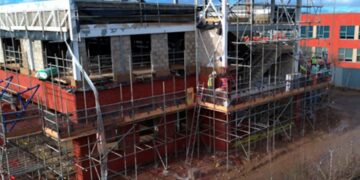COUNCILS are being encouraged to delay collecting money from housing developers designated for community contributions.
But the leader of the borough council said that it would be catastrophic for council finances if any money was lost.
On Wednesday, May 13, the Ministry of Housing, Communities and Local Government announced house builders could be given more discretion in the late payment of the Community Infrastructure Levy (CIL).
The announcement stated that: “Local authorities may wish to consider now to ease the burden on developers.”
Although the decision is at the discretion of the council, the Government is “encouraging” them to delay CIL payments.
Cllr John Halsall, leader of the borough council said: “We have one of the highest CIL rates in the country, and developer contributions are vital to meet the infrastructure bill and provide affordable housing.
“It would be catastrophic for the Wokingham borough if any CIL is lost. We have to build infrastructure in anticipation of developments. You can’t build houses if there is no road to reach them.
“And we can’t lose money that has already been committed to infrastructure projects. There’s £60 million of CIL at risk. But I’m not anticipating the council losing anything.
Cllr Carl Doran, Labour lead for planning also belives the council should avoid delaying payments.
He said: “I think it would be dangerous to get involved in things like this for big developers.
“The big complaint from residents is always the lack of infrastructure, that is very heavily included in the draft local plan update now, although it was also included in the local plan 10 years ago.”
Cllr Doran said: “But Wokingham Borough Council finances have already been hit by the pandemic, I don’t think they can afford to help developers.”
And Cllr Rachelle Shepherd-DuBey, Liberal Democrat councillor for Winnersh and lead for housing, said: “Because of the recession, people won’t have the money to buy houses, but investment buyers will. That’s not good for communities. Instead, we need more large infrastructure projects to help the local economy.
“We need to build and maintain parks, schools and roads, and CIL money is needed desperately.”
Leader of the town council, Cllr Imogen Shepherd-DuBey said she doesn’t think CIL money will be paid at the speed originally anticipated.
“We are not expecting it to come in at the same rate as previously expected,” she said. “We may have to delay some projects or risk borrowing lots of the money — which would bring extra costs.”
Cllr Doran also said that the borough council should be doing more to to build their own affordable housing.
“Developers can argue that it is not commercially viable to build affordable housing if they make less than approximately 15% profit on the home.
“But Wokingham Borough Council are building flats at Carnival Pool, and as the developer, they have decided they are not making a big enough profit to build affordable housing there.
“The council shouldn’t be looking to make a profit on affordable housing, it’s disgraceful.”
And Cllr Shepherd-DuBey said the borough council should be setting an example when it comes to affordable housing.
“The council has claimed that the profit from house sales in the Carnival Pool development is being used to help fund the Carnival Pool cost itself,” she said. “But it’s important to build homes for everyone, not just the rich. So we must keep building affordable homes.”
And nationally, the National Housing Federation (NHF) and the Chartered Institute of Housing (CIH) are among those concerned that new advice could impact the delivery of affordable homes.
It comes as a campaign to build 100,000 affordable homes for key workers launched on Thursday, May 7.
The Homes for Heroes campaign was launched by an alliance of housing associations, and many others across the property sector calling for the private, public and charitable sectors to join together and build low cost homes for key workers in the Covid-19 pandemic.
It is inspired by the Homes fit For Heroes programme, which launched after the First World War.
Helen Evans, chair of the G15 — a group of London’s largest housing associations — said: “Essential workers on the frontline of this crisis are often among the lowest paid in society. Homes for Heroes is about giving these people a safe, secure and genuinely affordable home to live in.
“With the collaboration of government and the housing sector, both private and social, we should bring forward a once-in-a-generation number of new homes for our essential workers, including those not eligible for traditional key-worker housing.
“Homes should be well designed, with private outdoor space, in convenient well-connected locations for healthcare facilities, schools and other employment hubs.”
















































